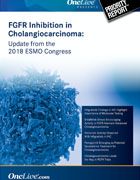Publication
Article
Special Issues
Pemigatinib Emerging as Potential Second-Line Treatment for Cholangiocarcinoma
Author(s):
The potent FGFR1-3 inhibitor pemigatinib showed preliminary efficacy and safety signals in the phase II FIGHT-202 trial (NCT02924376) of patients with previously treated advanced, metastatic or surgically unresectable cholangiocarcinoma.
Antoine Hollebecque, MD
The potent FGFR1-3 inhibitor pemigatinib (INCB054828) showed preliminary efficacy and safety signals in the phase II FIGHT-202 trial (NCT02924376) of patients with previously treated advanced, metastatic or surgically unresectable cholangiocarcinoma. Data from the first 47 patients with FGFR2 translocations enrolled in cohort A were presented at the 2018 ESMO Congress.
“In this interim analysis of patients from cohort A who had at least 8 months of follow-up, pemigatinib was generally well tolerated and demonstrated preliminary efficacy in previously treated patients with cholangiocarcinoma harboring FGFR2 translocations,” principal investigator Antoine Hollebecque, MD, senior medical physician at Institut Gustave Roussy, and co-investigators wrote.
To be eligible for enrollment, patients must have had a histologically or cytologically confirmed CCA and failed ≥1 prior treatment, have radiographically measurable disease, adequate hepatic and renal function, and an ECOG performance status ≤2. Patients were ineligible if they had received previous treatment with select FGFR inhibitors.
The trial has 3 cohorts: FGFR2 translocations (cohort A, n = 100), other FGF/FGFR2 genetic alterations (cohort B, n = 20) and no FGF/FGFR2 genetic alterations. Of the 47 patients evaluable in cohort A, 44 patients (94%) had intrahepatic cholangiocarcinoma, 46 (98%) had an ECOG performance status ≤1, and 28 (60%) had received ≥2 prior therapies.
The primary endpoint of this study was overall response rate (ORR) in cohort A, which was 40.4% (95% CI, 26.4%-55.7%). Nineteen patients (40.4%) had a confirmed partial response, while 21 patients (44.7%) had a best response of stable disease.
Secondary endpoints in cohort A included duration of response (DOR), and in cohorts A, B, and C, investigators evaluated disease control rate (DCR), progression-free survival (PFS), overall survival (OS), and safety. Median DOR in cohort A was not reached at the time of data cutoff, but investigators noted that the probability of maintaining response ≥6 was 86.2% (95% CI, 55.0%-96.4%). DCR was 85.1% in cohort A, 45.5% in cohort B, and 22.2% in cohort C. Median PFS in cohort A was 9.2 months, 2.1 months in cohort B, and 1.7 months in cohort C. Median OS in cohort A was 15.8 in cohort A, 6.8 months in cohort B, and 4.0 months in cohort C.
The most common treatment-emergent adverse events (TEAEs) in all patients treated with pemigatinib were hyperphosphatemia (60.7%), alopecia (41.6%), diarrhea (39.3%), decreased appetite (37.1%), fatigue (36.0%), and dysgeusia (36.0%). The most frequent grade ≥3 TEAEs were hypophosphatemia (13.5%), abdominal pain (6.7%), arthralgia (6.7%), and fatigue (4.5%).
Although 5 patients experience TEAEs that resulted in a fatal outcome, investigators deemed that those results were not related to pemigatinib. Deaths on the study were attributed to failure to thrive, abdominal distension, sepsis, malignant neoplasm progression, dyspnea, pleural effusions, and cholangitis.
Dysregulation of FGFR signaling by FGFR translocation may be associated with the pathogenesis of cholangiocarcinoma. This led to the rationale to use pemigatinib in a trial that enrolled patients with documented FGF/FGFR gene alterations.
Currently, the median OS and PFS rates for patients with cholangiocarcinoma receiving second-line therapy are low, at 7.2 and 3.2 months, respectively. Pemigatinib may offer a second-line option for patients who otherwise have no well-established treatment options after failure of first-line gemcitabine and cisplatin. Additionally, this oral agent has previously shown efficacy in patients with FGF/FGFR genetically-altered tumors.
“Overall, these results support continued development of pemigatinib as a promising treatment for patients with CCA harboring FGFR2 translocations,” Hollebecque et al noted.
Recruitment is closed, and data on the overall study population will be presented at a later date.
Hollebecque A, Borad M, Sahai V, et al. Interim results of FIGHT-202, a phase II, open-label, multicenter study of INCB054828 in patients (pts) with previously treated advanced/metastatic or surgically unresectable cholangiocarcinoma (CCA) with/without fibroblast growth factor (FGF)/FGF receptor (FGFR) genetic alterations [published online ahead of print October 23, 2018]. Ann Oncol. doi: 10.1093/annonc/mdy282.139.







%20(2)%201-Recovered-Recovered-Recovered-Recovered-Recovered.jpg?fit=crop&auto=format)

%20(2)%201-Recovered-Recovered-Recovered-Recovered-Recovered.jpg?fit=crop&auto=format)
%20(2)%201-Recovered-Recovered-Recovered-Recovered-Recovered.jpg?fit=crop&auto=format)